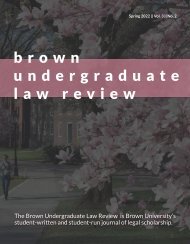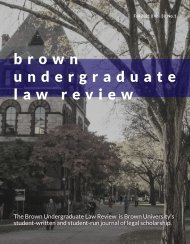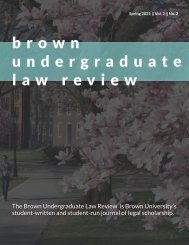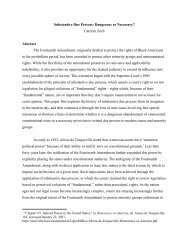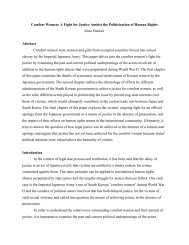From Frontiero to the Air Force: Citizenship and Equal Protection in U.S. Reproduction Jurisprudence
Olivia Siemens '21
Olivia Siemens '21
You also want an ePaper? Increase the reach of your titles
YUMPU automatically turns print PDFs into web optimized ePapers that Google loves.
substantive issue. Ely’s conception of a level democratic playing field does not merely permit
but requires the Constitution to protect against any form of discrimination that leads to
procedural unfairness. Representation alone, Ely recognizes, is often insufficient to guarantee
participational equity in a society where a legislative majority may manipulate the law to
reproduce discriminatory processes.
This is why, in Ely’s view, the Carolene Products footnote theorizes a higher level of
scrutiny for laws that may uniquely impact the rights of “discrete and insular minorities.” 12 Ely
writes, “[T]hey ask us to focus… on whether the opportunity to participate either in the political
processes by which values are appropriately identified and accommodated, or in the
accommodation those processes have reached, has been unduly constricted.” 13 Ely understands
that substantive inequality in the political process triggers a vicious cycle of procedural inequity.
Discriminatory laws not only diminish the substantive liberties of a given minority group but
also prevent this group from addressing their grievances through normal democratic
channels—virtually guaranteeing perpetual discrimination in subsequent policy outcomes. In
order to protect the participatory interests of all citizens, he posits, the Court may call for such
legislation to withstand “more exacting judicial scrutiny under the general prohibitions of the
Fourteenth Amendment.” 14
Sex Equality and the Court
Still, the Supreme Court was slow to apply this exacting scrutiny standard to cases
involving sex classifications. Over fifty years passed after the passage of the Nineteenth
Amendment before the Court truly recognized sex discrimination as a minority rights issue.
Finally, beginning in the 1970s, the Court started to see sex discrimination, in many of its forms,
as an unconstitutional violation of the rights and liberties of both men and women. In a series of
12
United States v. Carolene Products Co. was a 1938 case that upheld a federal law restricting shipments of certain
milk substitutes under rational basis review. The majority opinion, written by Justice Harlan Stone, contains a
footnote (Footnote 4), which indicates that the Court should apply a higher form of judicial scrutiny to laws that
might disproportionately infringe on the constitutional rights of “discrete and insular minorities.” Stone did not
specify the requirements of this “exacting standard,” but subsequent courts have nevertheless referenced Footnote 4
in their development of both “intermediate” and “strict” scrutiny tests. See: United States v. Carolene Products Co.,
304 U.S. 144 (1938).
13
Ely, Democracy, 77.
14
Ibid., 76.
6




